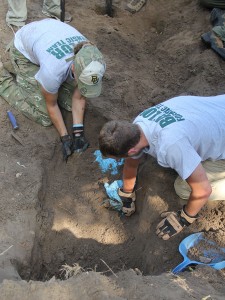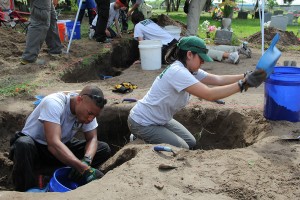
Stevie Hope, a 2014 Baylor anthropology graduate, and Cole Lindeberg, a senior anthropology major, work to exhume an unmarked grave at a cemetery in South Texas.
Every year hundreds of immigrants attempt to cross over the United States’ southern border; the road is long and arduous and for many it proves to be fatal. Many of the deceased do not bare any pieces of identification, so when they are discovered, the authorities have now way to return their remains to their families; consequently, the bodies are buried in unmarked graves. These disappearances unfortunately leave many families with questions and without resolution as to whether or not their loved one died crossing. For a select group of Baylor of students, led by Associate Professor of Anthropology Dr. Lori Baker, the opportunity to meet a humanitarian need while doing research for their field of study is highly appreciated. With that need in mind, every year Baker and her students travel to locations near the border in South Texas to recover and identify the bodies of those who died crossing over, so that their remains may be returned to their families.
Over the years, the team has made a shocking and unsettling discovery about the identities of many of the deceased who seek a new life in America: many who make this journey are young people seeking a life away from the violence and poverty experienced in their native country
“Right now about one-fifth of the remains we have recovered and analyzed are of minors,” Baker said. “As a mom, my heart breaks to have their small skeletons in our lab when they should be with their families. I cannot imagine the anguish these mothers feel not knowing the fate of their child. Families tell me that even though the journey to the United States is dangerous, at least there is hope. There is no hope if they stay at home.”
Each year under the guidance of Baker, anthropology students embark on the time consuming and effort-full process of identifying and returning the deceased to their families. In the most recent expedition this past summer, students went on a forensic excavation where they worked with Texas Rangers and other law enforcement officials. For the students, the process of finding and exhuming a body is very tedious and labor-intensive. The students have to grid out the plot of land and then remove vegetation and soil, layer by layer, constantly doing probe tests to determine how close they are to a body.
After the process of exhuming the bodies is completed, the bodies are shipped to labs across Texas. Baylor often collaborates with Texas State University, sharing their state-of-the-art forensics lab, to identify the bodies. Once the bodies are transported and arrive at the TSU facility, they are processed. From the skeletal remains, the team can determine the deceased’s age, sex, any abnormalities or unique traits of their body, and their DNA. The team consults a database where families post information about missing family members, cross-referencing the individuals on the website with the traits of the bodies that they have recovered. After finding possible matches, the team then contacts the family to get a DNA sample, in order to confirm if the body is truly a match.
The process of exhuming and identifying bodies not only takes a physical toll on the students, but an emotional one as well.
According to Senior anthropology major Helen Garcia, “It’s hard to separate your emotions from the science. When you find someone, you have mixed emotions; you’re happy to be that much closer toward your objective but sad because that means another person passed away trying to cross the border.”

Xavier Colbert, a 2014 Baylor anthropology graduate, and Zoe Salinas, a senior anthropology major, work to uncover a body believed to be an immigrant who died while attempting to cross into the United States.
Senior anthropology major Joe Kirkland agrees, “I think anyone, scientists or not, would have the same experience seeing another human dead; it’s unpleasant. However, when we are on an expedition we know what we had signed up for and we know our job is to identify these individuals so that we can return them to their families.”
Coupled with the emotions that come from interacting with a deceased human, many of the students feel a personal connection to the deceased. For Garcia, her work with the individuals hits especially close to home, as she feels that she has a cultural connection with them.
“My family comes from a Latino-immigrant background, so I feel like I have a special connection to these individuals that others may not have,” Garcia said. “I take the objective of providing answers and closure for these families very personally.”
For the students, seeing all of their hard work result in a family finding resolution makes their efforts well worth the time and work put into the project.
According to Kirkland, “The most rewarding part of this process is getting to see the amazing joint effort of so many different individuals and institutions to reunite the remains of the deceased with their families, ultimately providing them with closure.”
Garcia said, “I would like for people to understand the humanitarian impact that forensics can accomplish, we’re not just the cold-hearted CSI detectives that you see on television, we want to use our skills and gifts to help people.”
This story is part of a series of research highlights by Caleb Barfield, a student web editor in the Office of the Vice Provost for Research. Caleb is a sophomore from Denton majoring in journalism, new media and public relations. Click here to read more of his work.
